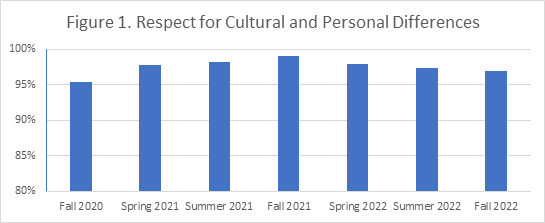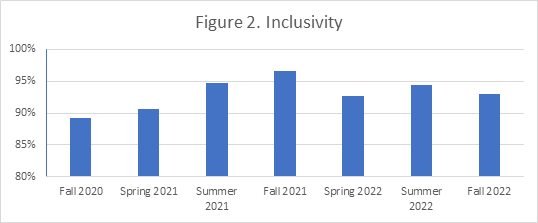The ICRE is committed to upholding our teaching mission by ensuring that diversity, equity, inclusion, and justice are pervasive throughout our curriculum. As a way to ensure transparency and accountability, we will state our intentions for improvement or change, provide information about the actions we are taking, and publish the results of those actions here.
ASSESSING JEDI ACROSS THE ICRE
As of the end of the Fall 2022 semester, ICRE students have consistently agreed or strongly agreed that ICRE instructors showed respect for cultural and personal differences across all students (Figure 1). Our instructors have exceeded 90% on this metric since AY 2021, our base year.

Figure 1: A bar chart shows the percentage of ICRE students who agreed or strongly agreed that their instructor(s) showed respect for cultural and personal differences. The results were: Fall 2020: 95% (baseline); Spring 2021: 97%; Summer 2021: 98%; Fall 2021: 99%; Spring 2022: 97%; Summer 2022: 96%; Fall 2022: 95%.
Similarly, ICRE students agreed or strongly agreed that ICRE instructors worked to incorporate learning materials that are inclusive of racial, gender, ethnic and/or other differences (Figure 2). Our instructors have strongly exceeded 90% on this metric since the 2021 spring semester, which indicates an increasing level of awareness and implementation of course materials that incorporate learning materials that are inclusive of racial, gender, ethnic and/or other differences.

Figure 2: A bar chart shows the percentage of ICRE students who agreed or strongly agreed that their instructors worked to incorporate learning materials that are inclusive of racial, gender, ethnic and/or other differences. The results were: Fall 2020: 85% (baseline); Spring 2021: 91%; Summer 2021: 94%; Fall 2021: 97%; Spring 2022: 93%; Summer 2022: 94%; Fall 2022: 98%.
ASSESSING JEDI IN THE CURRICULUM
Time to Act: A Rubric-Based Approach to Self-Assessment
In 2022, the ICRE undertook a self-assessment to gauge its current position as a just, equitable, diverse, and inclusive (JEDI) institute and to create a plan to guide improvements. Read our manuscript in the Journal of Clinical and Translational Science.
What We Did
We assembled a task force to create and apply a rubric to identify short- and long-term JEDI goals, assess the current state of JEDI at our Institute, and make recommendations for immediate action. To ensure deep buy-in, we gathered input from diverse members of our academic community, who served on targeted subcommittees.
1
Adapt the rubric.
2
Apply the rubric to determine the ICRE’s current level of JEDI development in each rubric dimension along a continuum of Emerging Developing Transforming.
3
Recommend components that the ICRE should focus on to improve its institutionalization of JEDI.
4
Report the findings to ICRE leadership and create a plan for implementation.
.png)
After applying the rubric and determining the ICRE’s level of JEDI institutionalization, the task force produced a total of 13 suggested focus items. (Table 1.)
| Return on Investment (ROI) Level | Focus Items |
|---|---|
| Lowest ROI (low impact, high difficulty) |
|
| Strategic (high impact, high difficulty) |
|
| Low-Hanging Fruit (low impact, low difficulty) |
|
| Highest ROI (high impact, low difficulty) |
|
Representatives of the task force presented its full report to ICRE Director Dr. Rubio and recommended that she choose two or three specific action items and create a timeline to achieve them. Dr. Rubio chose four items and she and the task force collaboratively developed an approach and a timeline for implementation. (Table 2.)
| Matrix Item | Implementation Approach | Timeline |
|---|---|---|
| Disseminate opportunities to learn about JEDI workshops and other training opportunities to our students | Dissemination through the ICRE Student e-newsletter | December 8, 2022, thereafter the second Thursday of every month |
| Encourage all staff to extend JEDI training to include evidence of intersectionality and provide paid time off to do so | Dissemination training opportunities via email as they are identified. | Starting October 21, 2022 and continuing indefinitely |
| Develop ICRE-wide definitions for justice, equity, diversity, and inclusion | Linked to established University definitions on ICRE website | October 21, 2022 |
| Create an official strategic plan for advancing JEDI in the ICRE | Write strategic plan; provide to ICRE Diversity Committee for approval. | January 2023 and will be complete in October 2023 |
Dr. Rubio also accepted the task force’s recommendation that ICRE leadership
- Choose two or three focal components from the matrix each fiscal year,
- Create a plan and timeline to achieve them,
- Publish these plans on the ICRE web site to provide transparency and to allow the community at large to hold the ICRE accountable for progress, and
- Reapply the rubric in 18 months (April 2024) to evaluate continuing progress. Read the Task Force Report.




